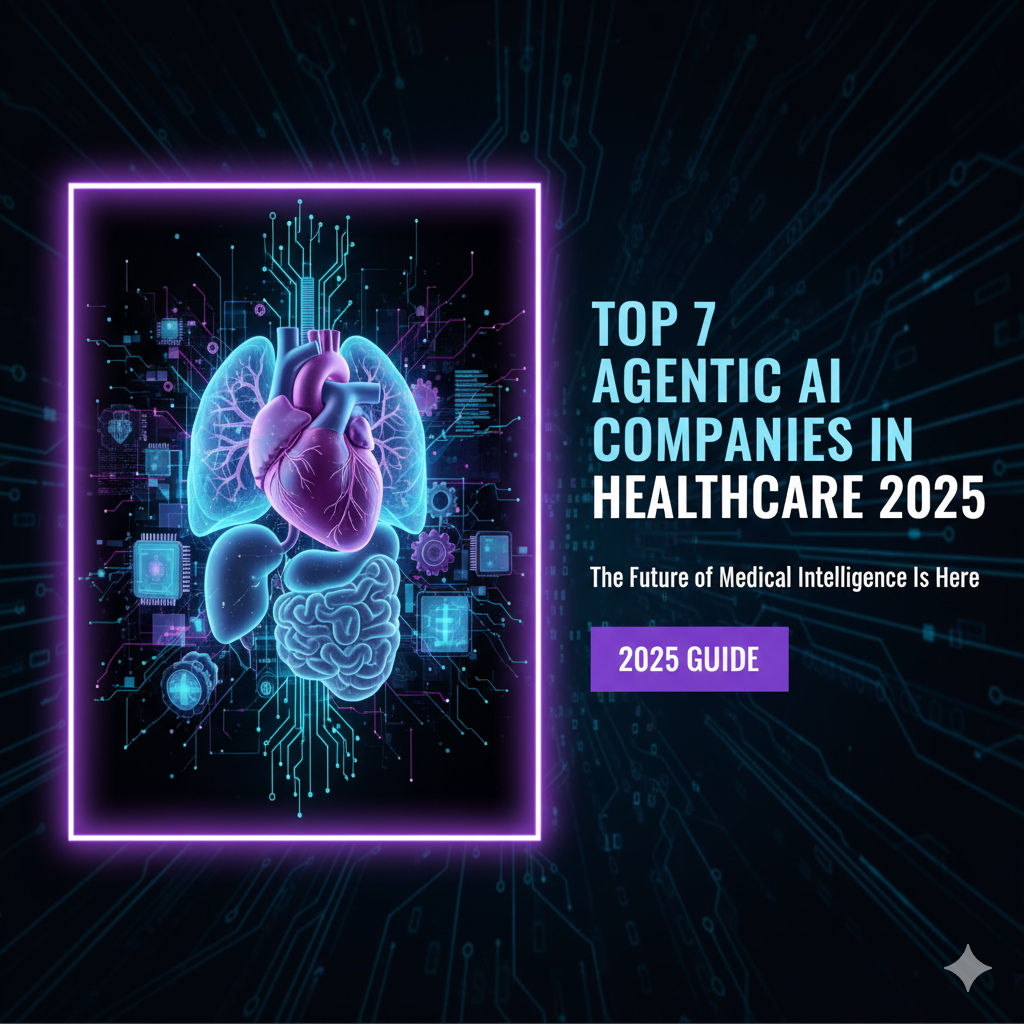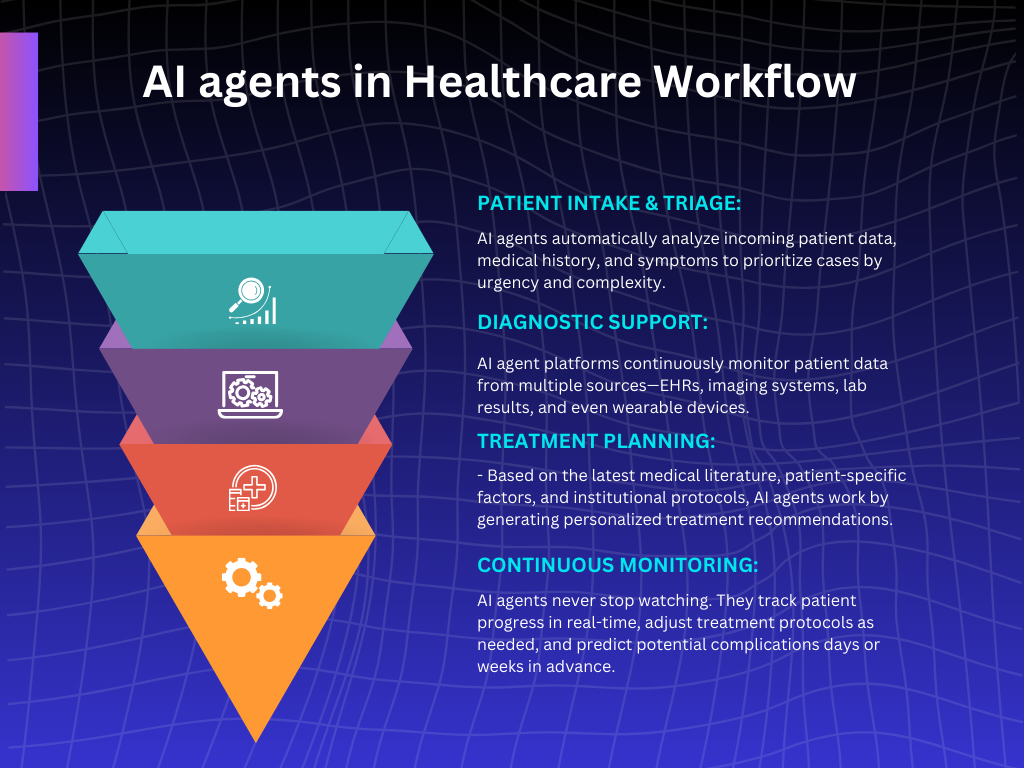
Top 7 Agentic AI Companies in Healthcare 2025: The Future of Medical Intelligence is Here

It's 4 AM, and a patient's vitals suddenly spike in the ICU. Before the nurse even reaches the bedside, an AI agent has already analyzed the patient's entire medical history, cross-referenced current medications, identified potential complications, and suggested the optimal intervention protocol. This is happening right now in hospitals powered by agentic AI companies in healthcare.
The healthcare industry is experiencing a seismic shift. Traditional automation could handle simple, repetitive tasks, but agentic AI in healthcare represents something far more revolutionary. These aren't just tools; they're intelligent digital colleagues that think, reason, and act autonomously to solve complex medical challenges.
Here's what's remarkable: while you've probably heard of the big tech giants dabbling in healthcare AI, some of the most innovative agentic AI companies are flying under the radar, quietly transforming how hospitals operate and how patients receive care.
By 2025, these companies aren't just participants in the healthcare revolution, they're leading it.
What Is Agentic AI in Healthcare and Why Is It Different?
Let us break this down for you in simple terms. Think of traditional healthcare software as a very sophisticated calculator—it processes data when you ask it to.
Agentic AI in healthcare, on the other hand, is like having a brilliant medical resident who never sleeps, never gets tired, and can simultaneously monitor hundreds of patients while continuously learning from every interaction.
AI agents in healthcare are autonomous systems that can perceive their environment (patient data, medical images, lab results), make decisions based on complex reasoning, and take actions. They're powered by advanced technologies like GPT-4, Claude 3, and Retrieval-Augmented Generation (RAG) that allow them to understand context, learn from experience, and adapt to new situations.
What makes agentic AI companies in healthcare different from traditional healthcare IT vendors is their focus on true autonomy. While legacy systems require humans to input commands and interpret outputs, agentic AI systems can identify problems, develop solutions, execute plans, and even learn from the results to improve future performance.
The Manual Workflow Today (And Its Challenges)
Let's be honest about the current state of healthcare operations. You're dealing with a perfect storm of inefficiencies that are costing your organization millions and, more importantly, potentially compromising patient outcomes.
Here's what your teams are probably struggling with right now: Clinical documentation that takes 2-3 hours per patient, manual appointment scheduling that leads to 15-20% no-show rates, diagnostic delays averaging 7-14 days for complex cases, and administrative tasks that consume 60% of your healthcare professionals' time.
Your staff is burning out, your patients are frustrated with wait times, and your executives are under pressure to improve both quality and cost-effectiveness. The problem is that human cognitive capacity has limits, and healthcare complexity has exceeded those limits.
Medical errors affect 1 in 10 patients globally, largely due to information overload and fragmented workflows. Your teams are drowning in data but starving for actionable insights.
The Agentic Workflow: How It Works Step-by-Step
Now, imagine a completely different reality where agentic AI companies in healthcare have transformed your operations. Here's how the AI agents workflow functions:

- Patient Intake & Triage: AI agents automatically analyze incoming patient data, medical history, and symptoms to prioritize cases by urgency and complexity. High-risk patients are flagged immediately, while routine cases are streamlined through automated pathways.
- Diagnostic Support: AI agent platforms continuously monitor patient data from multiple sources—EHRs, imaging systems, lab results, and even wearable devices. They use advanced machine learning models to identify patterns, suggest differential diagnoses, and alert clinicians.
- Treatment Planning: Based on the latest medical literature, patient-specific factors, and institutional protocols, AI agents work by generating personalized treatment recommendations.
- Continuous Monitoring: AI agents never stop watching. They track patient progress in real-time, adjust treatment protocols as needed, and predict potential complications days or weeks in advance.
Real-World Benefits & ROI
The numbers don't lie, and when you see what agentic AI companies are delivering, the ROI becomes undeniable. According to McKinsey's 2024 healthcare AI report, organizations implementing agentic AI solutions are seeing 40-60% reduction in administrative costs, 25-35% improvement in diagnostic accuracy, and 50-70% faster time-to-treatment for complex cases.
Clinical decision support powered by agentic AI in healthcare reduces medical errors by up to 45%, potentially saving millions in malpractice costs and, more importantly, lives.
Patient satisfaction scores improve when AI agents in healthcare streamline scheduling, reduce wait times, and enable more personalized care. Staff satisfaction also increases significantly as healthcare professionals can focus on what they trained for.
Why Now? (Trends Making Agentic AI Mainstream)
You're witnessing a perfect convergence of factors that make 2025 the breakout year for agentic AI companies in healthcare. First, the technology has finally matured—large language models like GPT-4 and Claude 3 have achieved human-level performance on many medical reasoning tasks, while no-code agent builders are making deployment accessible to non-technical healthcare administrators.
Second, the business case is compelling. Agentic AI development companies are providing solutions that directly address these economic pressures while improving quality of care.
Third, regulatory frameworks are evolving to support AI adoption. The FDA's AI/ML Software as Medical Device framework provides clear pathways for approval, while HIPAA compliance tools ensure patient data protection.
Finally, patient expectations are driving demand. Consumers who experience AI-powered personalization in retail and finance now expect the same level of intelligent, responsive service from their healthcare providers.
Designing for Trust: Patient Privacy in Agentic AI
As agentic AI becomes more deeply embedded in healthcare, patient privacy stands as a non-negotiable pillar of trust. AI agents now routinely process vast amounts of sensitive patient data, including electronic health records, lab results, and even real-time monitoring feeds.
For healthcare leaders, ensuring the security and confidentiality of this data is paramount—not just for regulatory compliance, but for maintaining the trust that underpins effective care delivery.
Healthcare organizations must design agentic AI systems with privacy at their core. This means implementing advanced encryption protocols, strict access controls, and comprehensive audit trails to monitor who accesses patient data and when.
Adhering to regulatory standards such as HIPAA and GDPR is essential, but leading organizations go further by embedding privacy-by-design principles into every layer of their AI systems.
By prioritizing patient privacy, healthcare professionals and organizations can confidently leverage the power of AI in healthcare, knowing that patient data is protected from unauthorized access or misuse.
This commitment to privacy not only safeguards patients but also strengthens the integrity and reputation of healthcare organizations as they adopt agentic AI to enhance care delivery.
The Importance of Healthcare Workers in AI Adoption
The successful integration of agentic AI in healthcare hinges on the active involvement of healthcare workers at every stage. While AI agents excel at automating administrative tasks and surfacing actionable insights, it’s the expertise and judgment of healthcare professionals that ensure these tools are used effectively and ethically.
Healthcare workers bring invaluable frontline experience to the development and deployment of agentic AI tools. Their feedback helps tailor AI systems to real-world clinical workflows, ensuring that automation supports—not disrupts—patient care.
Training is equally critical: when healthcare professionals understand the capabilities and limitations of AI agents, they can better collaborate with these systems, delegate appropriate tasks, and focus on complex decision making that requires human insight.
By fostering a culture of collaboration between healthcare workers and AI agents, healthcare organizations unlock the full potential of agentic AI. This partnership not only streamlines administrative tasks but also enhances patient care outcomes, as clinicians are empowered to spend more time with patients and less time on repetitive tasks. Ultimately, the future of AI in healthcare is not about replacing humans, but about augmenting healthcare teams to deliver better, more efficient care.
Top 7 Agentic AI Companies in Healthcare 2025
Before we dive into the companies, let us explain our methodology. We evaluated each organization based on five critical criteria:
- Real-world deployment scale (how many healthcare organizations are actually using their solutions)
- Innovation depth (the sophistication of their agentic AI capabilities)
- Use case breadth (how comprehensively they address healthcare workflows)
- Industry recognition (awards, partnerships, and thought leadership)
- Measurable outcomes (documented ROI and patient impact).
These are agentic AI companies in healthcare delivering tangible results in 2025.
1. OpenEvidence
OpenEvidence has carved out a crucial niche in evidence-based medicine. Their agentic AI in healthcare focuses specifically on clinical decision support, helping physicians access and apply the latest medical research in real-time patient care scenarios.
Their AI agents continuously scan medical literature, clinical guidelines, and treatment protocols to provide evidence-based recommendations. What's particularly valuable is their ability to contextualize research findings for specific patient populations and clinical scenarios.
2. Mandolin
Mandolin specializes in AI agents in healthcare for clinical documentation and coding. Their solution addresses one of healthcare's biggest pain points.
Their natural language processing agents can generate accurate clinical notes from physician dictation or patient interactions, automatically assign appropriate medical codes, and ensure documentation completeness for billing and compliance purposes.
3. Ampcome
Here's a company that's about to become impossible to ignore in the agentic AI companies landscape. Ampcome has quietly built the most comprehensive AI agent platform specifically designed for healthcare and hospitals, and their approach is refreshingly practical.
What sets Ampcome apart is their focus on integration with legacy systems. While other vendors force you to rip and replace your existing infrastructure, Ampcome's AI agents in healthcare work with HL7, FHIR, and DICOM standards right out of the box. They understand that you can't revolutionize healthcare by creating more silos.
Their multi-modal data processing capabilities are particularly impressive. Ampcome's agents can simultaneously analyze structured EHR data, unstructured clinical notes, and medical imaging to provide comprehensive insights.
The breadth of their healthcare use cases is staggering: diagnostic assistants that analyze medical images with greater accuracy than radiologists, virtual health assistants providing 24/7 patient support and predictive analytics agents that forecast patient outcomes.
What really catches attention is their enterprise-grade approach. Ampcome doesn't just sell healthcare AI—they provide agentic process automation across multiple industries.
4. Sully.ai
Sully.ai has developed conversational agentic AI companies solutions specifically for healthcare customer service and patient engagement. Their AI agents handle appointment scheduling, prescription refills, basic medical questions, and insurance inquiries.
What's impressive is their agents' ability to escalate complex issues to human staff while handling 70-80% of routine interactions autonomously. This significantly reduces call center costs while improving patient satisfaction through 24/7 availability.
5. Heidi Health
Heidi Health focuses on agentic AI development companies for primary care and family medicine. Their AI agents specialize in chronic disease management, preventive care reminders, and care coordination between multiple providers.
Their platform excels at longitudinal patient tracking, identifying gaps in care, and proactively reaching out to patients who need follow-up appointments or screenings. This population health management approach is valuable for accountable care organizations and value-based contracts.
6. FinThrive
FinThrive brings agentic AI companies technology to healthcare revenue cycle management. Their AI agents handle claims processing, denial management, and payment posting with remarkable accuracy and speed.
Their agents can identify claim issues before submission, automatically appeal denied claims with appropriate documentation, and optimize billing workflows to accelerate cash flow. For healthcare CFOs, FinThrive's ROI is immediately measurable.
7. SoundHound's Amelia for Healthcare
SoundHound has adapted their Amelia conversational AI platform for healthcare applications. Their AI agents in healthcare excel at voice-powered interactions, making them particularly valuable for hands-free clinical environments.
Their agents can handle voice commands for EHR data entry, respond to spoken queries about patient information, and facilitate communication between care team members. This voice-first approach is especially valuable in sterile environments where touch interfaces are impractical.
Broader Trends & Future Outlook
The agentic AI companies in healthcare like Ampcome are proving that agentic AI expertise gained in healthcare translates effectively to other industries like logistics, finance, and manufacturing. This cross-pollination is accelerating innovation and reducing costs.
Edge computing is enabling agentic AI in healthcare to operate closer to the point of care, reducing latency and improving privacy. Expect to see more AI agents running on local hospital servers or even bedside devices rather than relying solely on cloud infrastructure.
Regulatory frameworks are also maturing. The FDA's evolving guidelines for AI/ML medical devices provide clearer pathways for approval, while international standards for AI in healthcare are creating consistency across markets. This regulatory clarity is encouraging more agentic AI development companies to enter the healthcare space.
Perhaps most significantly, the success of AI agents in healthcare is creating a flywheel effect. As more healthcare organizations see positive results, adoption accelerates, which drives more investment, which funds more innovation, which improves outcomes, which drives more adoption.
How to Get Started with Agentic AI Companies in Healthcare?
If you're ready to explore how agentic AI companies in healthcare can transform your organization, the path forward is clearer than you might think. Start by identifying your highest-impact, highest-frustration workflows, and administrative tasks that consume significant staff time.
Companies like Ampcome offer comprehensive AI agent platforms that can address multiple use cases simultaneously, providing faster ROI and reducing vendor management complexity.
Consider scheduling a demonstration or pilot program to see agentic AI in healthcare in action within your specific environment. The best agentic AI companies will work with you to customize solutions for your unique workflows, patient populations, and operational constraints.
Final Thoughts
The healthcare industry stands at an inflection point. The agentic AI companies in healthcare featured here are partners in reimagining how healthcare can be delivered more accurately compassionately.
While established players like OpenEvidence and SoundHound bring proven track records, companies like Ampcome represent the future of truly comprehensive agentic AI in healthcare. Their multi-modal, enterprise-grade approach to AI agents in healthcare suggests that the most successful organizations will be those that think beyond point solutions.
The question isn't whether agentic AI companies will transform healthcare—it's whether your organization will be leading that transformation or trying to catch up.
Curious about how agentic AI could level up your healthcare organization? Let’s chat about your unique challenges and explore how these digital teammates can help you boost efficiency while giving patients the care they truly deserve.
FAQs
1. What exactly is “agentic AI” in healthcare?
Think of it as AI with initiative. Instead of waiting for you to prompt it every step of the way, agentic AI can plan, act, and adapt. It is almost like a smart digital colleague helping doctors, nurses, and admins.
2. How is agentic AI different from regular AI tools?
Most AI tools just answer questions or follow commands. Agentic AI takes it further—it can make decisions, automate workflows, and even collaborate across systems to reduce the manual load.
3. Where can healthcare organizations actually use agentic AI?
Lots of places! From streamlining patient scheduling and billing, to assisting doctors with diagnosis support, to improving care coordination.
4. Is patient data safe with agentic AI?
Yes—leading companies build their platforms with strict compliance (HIPAA, GDPR, etc.) and advanced security so that sensitive health information stays private and protected.
5. Why should hospitals and clinics pay attention to this now?
Because the future is already here. Organizations that start exploring agentic AI today will be ahead in patient experience, operational efficiency, and cost savings—while others are still playing catch-up.

Transform Your Business With Agentic Automation
Agentic automation is the rising star posied to overtake RPA and bring about a new wave of intelligent automation. Explore the core concepts of agentic automation, how it works, real-life examples and strategies for a successful implementation in this ebook.
More insights
Discover the latest trends, best practices, and expert opinions that can reshape your perspective
Contact us







.jpg)




